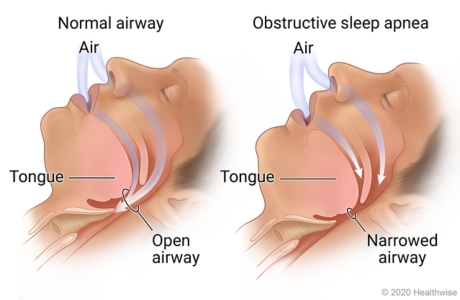What causes obstructive sleep apnea?
What increases your risk for obstructive sleep apnea?
Certain things increase your risk for obstructive sleep apnea. These include:
- Obesity.
People who have sleep apnea are more likely to be obese. Obesity is the factor most likely to lead to sleep apnea. - Neck circumference.
People who are overweight may have extra tissue around their neck, adding to their risk for sleep apnea. The risk increases for a man whose neck measures more than 17 in. around and for a woman whose neck measures more than 16 in. around. - Family history.
If other members of your family have sleep apnea, you are more likely to have it than someone who doesn't have a family history of it. - Enlarged tissues of the nose, mouth, or throat.
Enlarged tissues in the nose, mouth, or throat can block your airway while you sleep, making sleep apnea more likely. Surgery can sometimes correct the blockage and improve sleep apnea. - Aging.
Sleep apnea increases as people get older. - Being male.
Sleep apnea is more common in men. - Menopause.
Sleep apnea tends to occur more often in women who have been through menopause than in women who have not. After menopause, women get sleep apnea at a rate similar to men. - Bone deformities.
Bone deformities of the nose, mouth, or throat can interfere with breathing, causing sleep apnea. Some people who have sleep apnea have a small, receding jaw. Surgery can sometimes correct these deformities and improve sleep apnea. - Use of alcohol or medicine.
Drinking alcohol or taking certain medicines before going to sleep can increase the risk for sleep apnea. Medicines include some types of sleeping pills, opioids, and sedatives. - Sleeping on your back.
Sleeping on your back may make sleep apnea worse. - Smoking.
Smoking can increase your risk for sleep apnea, because the nicotine in tobacco relaxes the muscles that keep the airways open. - Disorders of the hormone (endocrine) system.
Disorders that may increase your risk include hypothyroidism and acromegaly.
What other health problems can happen when you have obstructive sleep apnea?
When you stop breathing because of obstructive sleep apnea, the oxygen levels in your blood go down and carbon dioxide levels go up. This makes your heart and blood vessels work harder and can affect your heart rate and nervous system. That in turn may:
- Lead to other problems, such as high blood pressure and heart disease.
- Make these other problems worse and harder to treat.
- Raise your risk of having a stroke.
- Make it harder for people with diabetes to control blood sugar.
How is snoring from sleep apnea different from regular snoring?
With obstructive sleep apnea, how loud and how often you snore changes often. Snoring disturbs your sleep, you stop breathing at times, and oxygen levels in your blood go down. If you don't have sleep apnea, snoring is steady and doesn't disturb your sleep. You don't stop breathing, and blood oxygen levels don't change.

